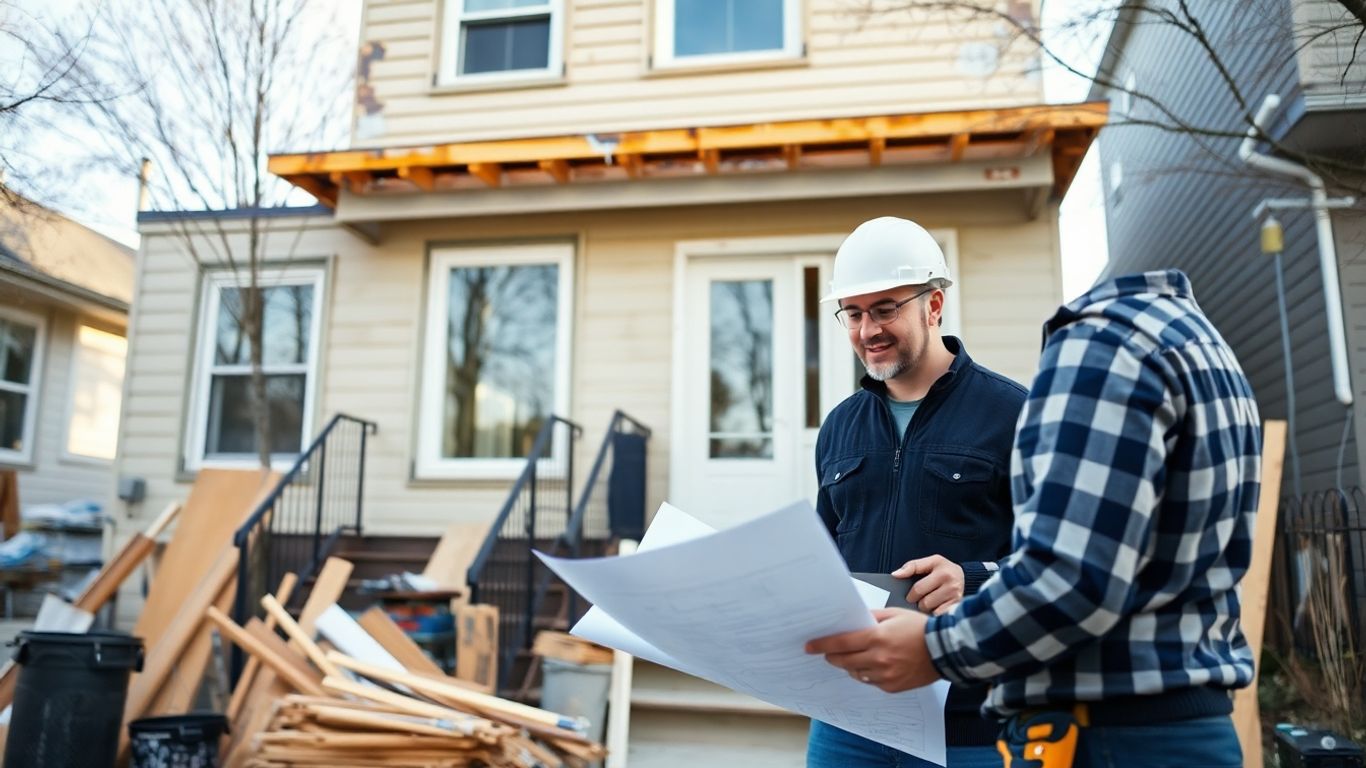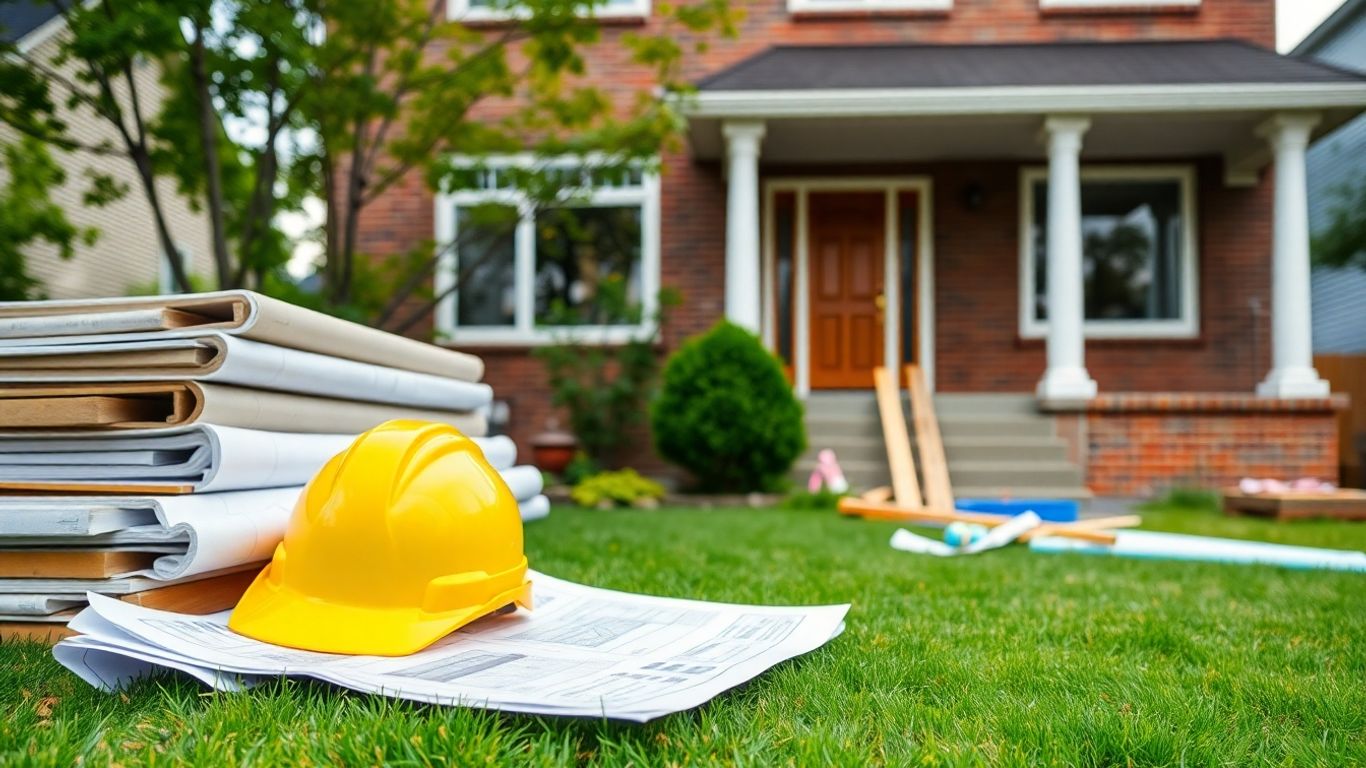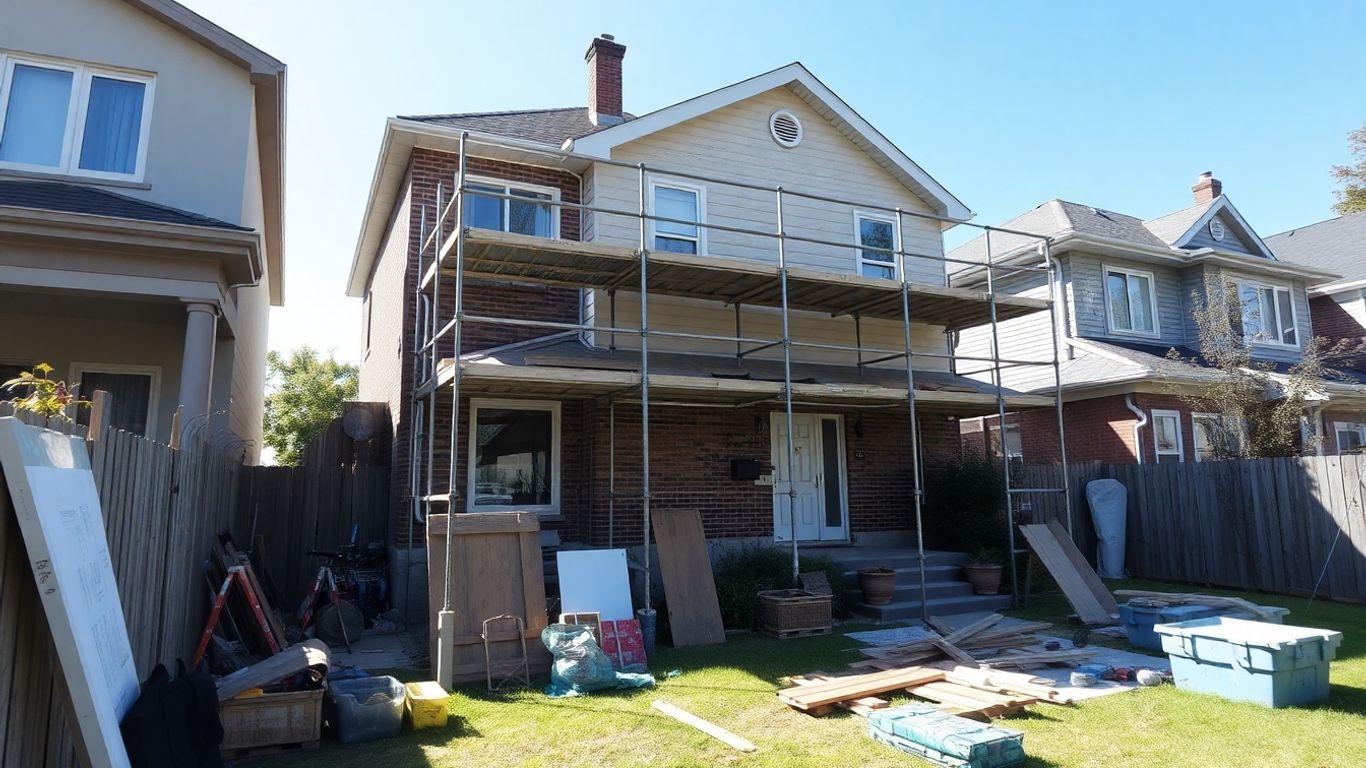Thinking about giving your home a facelift in Montreal or Laval? Before you start knocking down walls or swapping out old cabinets, there’s one thing you can’t skip: getting the right renovation permit. If you’re wondering, “How much is a permit in Montreal for renovation?”, you’re not alone. The process can feel confusing, and the costs aren’t always clear from the get-go. In this guide, I’ll walk you through what to expect, how to budget, and how to avoid the headaches that come with skipping permits or making common mistakes. Let’s get started so you can plan your project the right way.
Key Takeaways
- Permit costs in Montreal and Laval depend on your project’s size and type, usually ranging from a couple of hundred to over a thousand dollars.
- You need a permit for most major renovations, especially if you’re changing walls, plumbing, or electrical systems.
- Applying for a permit means filling out forms, submitting plans, and sometimes waiting a few weeks for approval.
- You can lower permit costs by narrowing your project scope or doing work in phases instead of all at once.
- Skipping the permit can lead to fines, delays, and trouble when selling your home—don’t risk it.
Planning a Renovation in Montreal & Laval? How Much Is the Permit?
When planning renovations in Montreal or Laval, one of the first things people start asking is: How much is a permit in Montreal for renovation? Whether it’s for a full kitchen overhaul, bathroom upgrade, or expanding your living space, getting a handle on permit costs can save you from grief (and big fines) later.
Getting a permit isn’t just about following rules; it’s a key part of your renovation plan and overall budget. Permit costs can seem a bit mysterious because they depend on what you’re changing, the size and value of your renovation, and exactly where your property is located. If you’re looking up the renovation permit cost in Laval versus Montreal, you’ll find there are differences between boroughs, and what counts as minor or major work isn’t always cut and dry.
Here’s what you need to know at the start:
- Permits are mandatory for most renovations bigger than just paint or minor repairs.
- Not having one can mean construction stoppages, penalties, and headaches when you try to sell your place later on.
- Costs are often calculated as a flat fee plus a percentage of the value of your renovation, with minimum charges.
| City | Typical Permit Range | Factors Impacting Fee |
| Montreal | $150 – $1,500+ | Project value, type (structural/other), borough |
| Laval | $75 – $1,000+ | Project size, type, building age |
Planning ahead for your permit costs can make a big difference, so build that into your renovation budget—and check specific borough requirements before you get too carried away.
If you find yourself unsure, don’t just guess—call your city’s permit office or check their website. Surprises at city hall are never fun, especially when it means halting your project halfway. Getting informed early will help you keep your renovation track and your stress levels down.
Types of Renovation Permits in Montreal & Laval
Getting a renovation permit in Montreal or Laval isn’t just a formality—it’s the law if your project goes beyond minor cosmetic changes. You’d be surprised how specific the Montreal building permit requirements and Laval home renovation regulations can get, so before swinging a hammer, it’s good to know what you’re dealing with.
There are several categories of renovation permits, each for a different scope of work:
- Structural Alterations: Needed if you’re removing or adding walls, expanding the building, or touching the foundation. Anything major that impacts the integrity of your home.
- Interior Updates: Permits may be required for significant kitchen or bathroom remodelling, especially if plumbing or electrical is involved. Even knocking down non-load-bearing walls can trigger the need for a permit.
- Exterior Modifications: Changing windows, doors, adding balconies, or even replacing exterior siding? You’ll likely need an exterior renovation permit. Roofing is also included here, and requirements can vary by borough.
- Accessory Structures: Thinking of adding a shed, garage, or deck? Different rules may apply, but nearly all such projects in Laval and Montreal need permits.
Here’s a quick reference for typical renovations vs. permit needs:
| Renovation Type | Permit Required? | Special Notes |
| Painting, flooring | No | Minor cosmetic work, no permit needed |
| Removing a wall (any) | Yes | Always check, structural or not |
| Changing windows/doors | Yes | Borough rules can be strict |
| Roofing repair/replacement | Yes | Permits often required |
| Adding a deck/shed/garage | Yes | Often size and location-based |
| Kitchen full remodel | Sometimes | Required if plumbing/electrical touched |
| Simple cabinet refacing | No | No structural or system changes |
When starting the permit process for home renovations in Quebec, the city will typically ask for a set of documents. Basic blueprints, a detailed description of the work, and even a list of materials might be on the checklist. More complex projects mean more paperwork—especially for condos or older homes. If you’re confused, check out what’s needed for the required documents for permit applications.
- The process isn’t fast, and processing times vary by project. Patience really helps here.
- Fines or stop-work orders can happen if you skip permits, so it’s best to be safe.
- Renovation services in Laval or Montreal sometimes offer to handle the paperwork for you—ask your contractor about it.
Even small projects can catch you off guard with unexpected permit needs, so always check with your city first to avoid headaches later.
Average Costs of Renovation Permits

Figuring out how much a renovation permit will cost in Montreal or Laval isn’t always simple. Fees vary depending on the scope of your project, the borough, and sometimes even the type of property. But most homeowners end up budgeting somewhere from $100 to over $1,000 just to secure the necessary permits. Larger, more complex renovations that involve structural changes, extra stories, or major plumbing/electrical work will land at the higher end of that scale.
Here’s a quick breakdown to give you a clearer idea:
| Renovation Type | Typical Permit Cost (Montreal) | Typical Permit Cost (Laval) |
| Basic interior (non-structural) | $100–$250 | $125–$300 |
| Structural changes/addition | $250–$900+ | $300–$1,000+ |
| Garage or extension | $400–$1,000+ | $450–$1,200+ |
| Demolition | $800–$2,000+ | $900–$2,200+ |
A few points to keep in mind:
- Permit fees are usually calculated based on the estimated cost of the work or the square footage.
- Each borough or city district may have its own fee structure and forms.
- There’s almost always tax (QST/GST) added to the permit fee.
- Special permits (like for heritage properties) may require extra documentation and higher fees.
Even if it feels like just more paperwork and expense, skipping the permit can mean costly fines or forced redo work later on. It’s almost always worth factoring these permit costs up front so you’re not surprised halfway through your renovation.
How to Apply for a Renovation Permit
Applying for a city permit for home renovation in Montreal and Laval can feel like a process, but with a bit of patience, it’s totally doable. If you’re planning major work like moving walls, altering plumbing, or anything that touches electrical systems, you almost always need to apply for a renovation permit. This goes for projects involving bathroom renovation services, kitchen renovation services, or Basement Renovation services. Not sure, “when do I need a building permit for renovations?”—if you’re doing more than just painting or swapping fixtures, you likely need one.
Steps to Apply for a Renovation Permit
- Get a Clear Project Scope: Write down exactly what you’ll change. This isn’t just bureaucracy—your details will define which permit you need. Every city (and borough, if you’re in Montreal) can have slight differences.
- Check Local Rules: Visit your city’s website or contact the permit office. They’ll list which documents you need (blueprints, material lists, proof of ownership, sometimes a contractor’s info). Make sure you follow current regulations and permits to avoid delays or fines.
- Gather Your Documents: Most applications require detailed plans, sometimes prepared by pros—especially for structural changes. You may need more info for larger jobs, like those common in kitchen or basement projects.
- Apply Online or In Person: Some boroughs offer online applications; others need paper forms. Fees depend on project value and type. Generally, you’ll pay more if the work is structural.
- Wait for Approval: The city reviews everything to ensure it matches bylaws and codes. Depending on their backlog, this might take a few days to several weeks.
- Display Your Permit: Once approved, post it where it’s visible from the street, as inspectors will check during and after the work.
Applying with care and attention upfront saves you hassle later—unexpected costs, work stoppages, or even having to undo your renovations can all happen if you skip the right steps.
Remember, even smaller projects can need a permit, especially in condos or row houses. Proper permits keep you on the right side of the law, make reselling easier, and protect you when hiring contractors for things like kitchen renovation services or basement work. If you’re ever unsure, it’s always better to call your city office before picking up your hammer.
Tips to Reduce Permit Costs
Everyone wants to save money when they’re planning renovations, and permit fees can feel like just one more thing on the to-do list. But skipping steps or rushing the process can end up costing you more in the long run. Here are some practical ways to keep those permit costs in check in Montreal and Laval:
- Scope Your Project Clearly: Write out exactly what you plan to renovate before you apply for permits. Changing your mind halfway through leads to new applications and extra fees.
- Do Your Homework: Each borough or city district has its own set of rules. Call your local permit office or check their website to see if you might qualify for an exemption or lower fee for smaller jobs.
- Apply for Multiple Permits Together: If you need several types of work done (like plumbing and structural changes), ask if combining them into one permit application will save you money.
- Plan Work During Off-Peak Seasons: Permits often process faster, and you may avoid rushed decisions that lead to mistakes or extra costs.
- Get Detailed Quotes from Contractors: Some contractors can handle the permit paperwork for you; just make sure their service fees for doing so are reasonable and clearly outlined.
- Phase Large Projects Where Possible: If the entire renovation is too expensive, see if you can do it in stages, keeping each phase under the threshold for higher permit fees.
Honestly, getting the permit isn’t the most exciting part of your renovation, but playing by the rules and being thorough can help you avoid big surprises – like fines or delays that throw your whole schedule off.
Common Mistakes Homeowners Make

Renovating in Montreal or Laval can get tricky, fast. One of the biggest mistakes is starting work before securing your permit. It’s tempting to get things moving, especially if you’ve already hired tradespeople like deck builders itching to start, but skipping this step could mean hefty fines or forced delays later.
Here are some of the most frequent mistakes homeowners run into during the permit process:
- Not double-checking whether the project actually needs a permit—some smaller jobs may not, but most structural or large-scale changes definitely do.
- Forgetting to gather all required documents (plans, contractor info, estimates) before applying can drag out the approval process.
- Relying on contractors (like deck builders) or designers to pull their own permits, even though it’s almost always the homeowner’s job to secure those in Quebec.
- Ignoring the need to check for special rules in your borough or municipality—what’s allowed in Laval might not fly in Montreal.
- Underestimating how long it’ll take for the city to review your application. Rushing or skipping steps can stall your whole project for weeks.
Sometimes, homeowners just want to get things done as quickly as possible, but cutting corners with paperwork tends to cause way more stress—and can end up costing thousands more than just doing it by the book from the start.
A bit of patience, careful prep, and not just trusting your deck builders or contractors to handle everything paperwork-wise can make a huge difference in keeping your renovation on track.
Conclusion
Wrapping up your renovation permit journey in Montreal or Laval, it’s pretty obvious that the process can feel overwhelming. Between sorting paperwork, digging into city rules, and figuring out all the costs, there’s a lot to keep track of. It all comes down to planning, knowing what to expect, and not letting surprises throw you off.
Here are a few key things to remember as you approach your own project:
- Always double-check specific permit requirements for your borough or suburb before starting any work.
- Factor in permit fees early in your budget—don’t assume it’s a minor cost.
- If you get stuck, talking to an experienced real estate agent (for instance, LJ Realties is a good point of contact for personalised real estate assistance) can really help untangle the process.
Following the right steps may not make the process exciting, but it’ll keep you out of trouble and probably save you both time and money in the long run. Mistakes with permits can quickly stall your renovation and cost a lot more to fix later, so getting things right from the start is just smart planning.
If you treat the permit phase as seriously as the rest of your reno checklist, you’re a lot more likely to see your project move ahead without unexpected headaches. Good luck, and happy renovating!
Thanks for reading! If you have questions or want to start your next project, don’t wait — reach out to us today. Visit our website to send us a message or get our phone number. We’re here to help make your ideas a reality!
Frequently Asked Questions
Do I always need a permit for home renovations in Montreal or Laval?
Not every renovation needs a permit, but most big changes do. If you are changing the structure, moving walls, or updating plumbing or electrical systems, you will need a permit. Painting, changing cabinets, or simple repairs usually don’t require one. Always check with your local city office to be sure.
How much does a renovation permit cost in Montreal or Laval?
Permit costs depend on the type and size of your renovation. Most permits cost between $100 and $400 for small projects, but big renovations can cost more. Some permits are priced based on the value of the work, usually about 1-2% of your total renovation budget.
How long does it take to get a renovation permit?
It usually takes between 2 to 6 weeks to get a renovation permit after you apply. The time depends on how busy your local office is and if they need more information from you. It’s a good idea to plan ahead and apply early.
Do you need a permit for basement renovation?
Yes. Most cities, including Montreal and Laval, require a permit for basement renovations, especially if your project involves structural changes, electrical work, plumbing, or adding bedrooms and bathrooms. Obtaining a permit ensures the work meets local building codes and safety standards.
What happens if I do renovations without a permit?
If you renovate without the right permits, you could get fined and might have to stop your project. You might also have trouble selling your house later, since missing permits can cause legal problems.
Can my contractor get the permit for me?
In most cases, the homeowner is responsible for getting the permit, but some contractors will help with the paperwork. Make sure you talk about this with your contractor before starting any work.
Are there ways to save money on permit costs?
Yes! You can save money by clearly planning your project and only getting permits for what you really need. Doing some smaller work in phases or combining projects might also lower your total permit fees. Always check with your city to see if there are ways to lower costs.
Do I need a permit for bathroom renovation in Quebec?
Yes, most bathroom renovations in Quebec require a permit, especially if plumbing, electrical, or structural changes are involved. Always check local regulations before starting your bathroom renovation.

